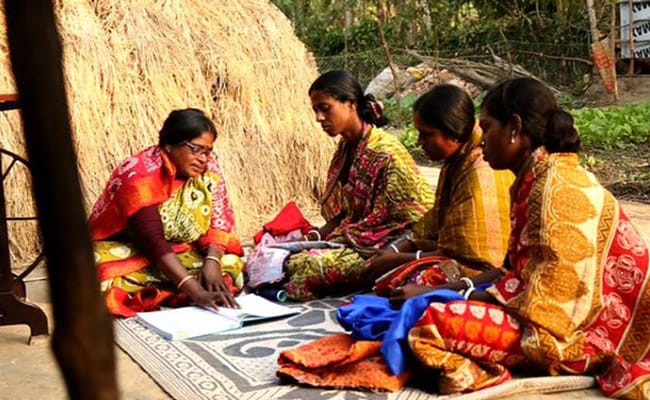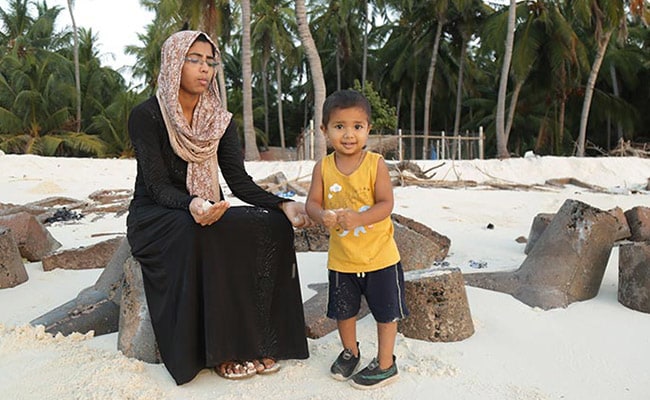- Home/
- From Andaman To Sundarbans, USHA Silai School Reaches The Remotest Islands And Villages To Empower and Upskill Women
From Andaman To Sundarbans, USHA Silai School Reaches The Remotest Islands And Villages To Empower and Upskill Women

Beyond the wildest forests, the deepest waters and the roughest seas, the USHA Silai School program is fructifying in the remotest islands of India. The Malyali Muslims of Lakswadeep, the tiger widows of Sundarbans and the tribals of Port Blair, the women from these marginalised communities have been bitten by the 'ambition' bug introduced by USHA. Their lives have changed and still continue to change, as they find their purpose enriched and empowered.
The largest mangrove delta in the world, Sundarbans, has inspired writers, poets and wildlife enthusiasts alike. The sublime beauty of this place is surpassed by the profound mystery of its dense swamp forests. Declared as a UNESCO world heritage site, it is inhabited by 4.5 million people and around 100 man eating tigers. Over the last four decades, more than 3,000 men have lost their lives due to the Human-tiger conflict in the region, leaving a large number of families to fend for themselves.
Also Read: The Women From USHA Silai School Kashmir Make It To The Lakme Fashion Week 2019
To empower the tiger widows of Sundarbans, USHA Silai School program reached out to ten women and trained them to open their own Silai schools. One of these women, Shakeela who hails from a small island village called Kalitala, lost her husband ten years ago to a tiger attack. Her husband's body was recovered after 3 days of his death when the Forest Rangers recognised her husband's head, left by the tiger. Her husband, the sole bread earner of the family, left behind a ten-year-old daughter and two sons, six and two-years-old each.

We didn't have any financial support after my husband's death, I had no money or food to feed my children. I started fishing but would only make Rs. 20-50 in a day, which was the only income my family saw around the time. Since I had to go fishing in the early hours of the morning and could return only in the evening, my daughter had to quit her studies to take care of her brothers.
Today, thanks to her USHA Silai training, Shakeela runs one of the Usha Silai schools in Kalitala since 2018.
14 kilometres from Kalitala, lies the village Paljoga, where Namita, another tiger widow, found independence under the USHA Silai School Model.

Namita, thanking the USHA Silai School initiative, said,
My son was 10 years old and my daughter was merely 9 months of age, when my husband - the only bread-earner of the family - died in a tiger attack, seventeen years ago. My daughter is physically challenged and I need money for her medical expenses. We struggled for years and I used to take any job that I could find to make money. A while ago, the village Panchayat encouraged me to join the Silai training organised by USHA. The training was for seven days - three days for setting and assembling of machine and the other four were for the stitching classes. With the help of this training and the USHA Silai School initiative, my life has become much better - I am earning well and I can finally take care of my family!
Moving on from Sundarbans, several boat rides across the delta, over 2,000 kilometres on road across the Konkan Coast and over the Arabian Sea, USHA Silai School is driving hope and determination in the reclusive Agatti Island of the Lakshwadeep Islands.
29-year-old Shabana, mother of two who runs one of the USHA Silai Schools in Agatti, takes care of her family all by herself, as her husband comes home only once in six months.

Speaking of the USHA Silai School initiative, Shabana quotes,
I took the 7-days-training from USHA Silai Program back in 2016 after which I started my own Silai School. Presently, there are about 24 students who are being trained in my school and I also advertise my school to get more enrolments. I am not dependent on anyone and I earn enough to take care of my family needs as well as my children's education.
Just like the Lakshwadeep Islands, there is another Indian archipelago, floating in the pristine waters of Bay of Bengal, splendidly isolated Andaman and Nicobar Islands, hold a special place in India's freedom struggle. The capital city of Port Blair is the proud bearer of the iconic national flag, hoisted by Netaji Subhas Chandra Bose in the year 1943. Today, as a popular holiday destination, it is now known for its enchanting beaches and diverse sea food. Historically, this quaint land has had its share of challenges that has shaped the life of the locals here.
Monika Bijung, a local Silai School teacher was abandoned by her husband ten-years-ago. After going through tough times, as far as contemplating suicide, she heard about the USHA Silai training through an NGO partners. She now runs her own Silai school and has a great number of students. Tapping into her creative side, she even designed a uniform for all her students.

Speaking about how the USHA Silai School changed her life, Monika says,
I have faced a lot of problems in my life. My husband started drinking after his retirement and was not taking care of the family and children. My elder daughter was 5 years old and the younger kids were 2 and 3 years old, when he left us and I was left alone to fend for my kids and myself. I met C Mohammed from UNATTI NGO who encouraged me to join Usha Silai School.
Also Read: Silai School Opens Up An Opportunity For Women In Kashmir To Be Part Of The Lakme Fashion Week
C Mohammed from the UNATTI NGO who introduced Monika to the world of USHA Silai school states,
The unemployment rate in Andaman and Nicobar Islands is very high. Although this problem is all over India but it is more prominent here. The reason for this is the absence of Industrial sector, the government jobs are at the neutral point and the only alternative is Self Help Groups (SHG). The focus of our NGO is women empowerment and we have been working with many international organizations, Usha International Ltd is one of them. We have trained around 1,200 - 1,500 women in this program.
The USHA Silai School Program has reached the most isolated and magical islands of India to bring empowerment, confidence and independence to women like Monika, Namita, Shakeela and Shabana. It's not just them, there are many like them who are now living an independent life and supporting their families on their own, thanks to the USHA Silai School Initiative.
Related Stories
More- Team NDTV | Monday February 16, 2026
Odisha's Suchismita Sahu, Rajasthan's Preeti Prajapat, Manipur's Akhirun—Usha Silai School's Kushalta Ke Kadam celebrates these awardees, from homemakers to master trainers earning accolades
- Team NDTV | Thursday February 12, 2026
From Ladakh peaks to Assam fringes, Usha Silai School trains tribal women in Turtuk, Kargil & Dakhinkuchi—crafting livelihoods with armed forces, NHPC & NGOs. Stitching national resilience
- Team NDTV | Thursday January 29, 2026
From West Bengal's transgender tailors to Telangana's tribal seamstresses and Meghalaya's embroidery revivalists, Usha Silai School's Kushalta Ke Kadam partners with NIRDPR and state governments
- Team NDTV | Tuesday February 03, 2026
In Odisha's mining heartlands, Mahanadi Coalfields Limited teams with Usha Silai School's Kushalta Ke Kadam and Gram Utthan, empowering tribal women turning them into entrepreneurs
Adopt a Silai School
About the Initiative

Kushalta Ke Kadam, an initiative by USHA Silai School and NDTV has entered its eighth season. The aim is to empower more women across rural India by teaching them sewing skills and helping them open new doors of opportunities for themselves. The initiative encourages rural women to become financially independent and entrepreneurs by taking up sewing and training others in their respective communities.
Since 2011, the USHA Silai School initiative has trained more than 12 lakh rural women through over 33,000 Silai schools, spanning over 20,751 villages across India.
The women earn Rs. 4,000 – 5,000 per month on an average, with the highest recorded monthly earning being Rs. 84,000 in a month. This earning works as a catalyst towards building their self-confidence, reducing gender inequities, and raising their stature within their families and in society at large.
In Pics

Rebari girls grow up learning traditional embroidery, which along with their new found sewing skills developed at Usha Silai Schools, is helping them earn a living.

Usha Silai School has empowered many rural women to support their family and send their children to school.

The Usha Silai School, established in a small nondescript village that goes by the name of Kottai, is helping empower people from varied communities.

The all-inclusive Usha Silai School Programme covers the entire nation from hamlets tucked between hills to villages cast by the sea.

Vegetables farmers from the Mizoram hills earn very little given the topography of the area. Usha Silai Schools have played an important part in this region by skilling women to financially contribute towards their households.

Usha Silai School learner Lucy has trained seven other women in her community, helping them to become financially independent.

Women like Kaviben from the nomadic Rebari community are finally laying down their roots as they begin to gain financial independence and thereby stability through Usha Silai School.

Usha Silai School, located in the Gujarat's Bhuj village, is enabling rural women to earn as much as Rs. 2,500-4,000 each month.

Usha Silai School, in association with a Gujarat based NGO called Kala Raksha, is trying to bring about a Silai revolution in Bhuj.

Besides training other women from their community, many Usha Silai School learners have become entrepreneurs in their own right.

With sewing becoming easily accessible and lucrative, the silai schools are also helping revive traditional motifs and designs.






